Do you enjoy word games? I’ve played all manner of them since childhood – hangman, word searches, even the minister’s cat.
I do crosswords, though often find them frustrating. I suspect the people who make up crosswords are the type who enjoy inflicting misery on their fellow man.
When playing Scrabble I tend to use obscure printers’ terms like em, en, and pica. I live in hope that one day I will get to lay quoin (a printer’s wedge) on a triple-word score.
I play word games on my phone, and adverts often pop up which claim exercising my brain is a good way to stave off conditions like Alzheimer’s Disease or dementia.
However, studies in the USA have claimed this type of “brain training” doesn’t actually do you much good. Continual practice improves your ability to play the game, they say, but doesn’t help much when you can’t remember which film that actor was in, or walk into a room and don’t know why.
But playing any game that improves your spelling skills is surely a good thing. Sometimes when you read your eye rapidly flicks over the shape of a word and you don’t really take in whether instil or instill is the correct spelling, whereas a game will make you concentrate on a word in isolation.
There are some good word games on TV. I think I’d be reasonably good at unravelling the conundrums on Countdown, but would struggle with the number puzzles. I can’t stand Pointless on the BBC at tea-time – if ever a name suited a TV show, that’s it!
My favourite word game, and all quizzes are really word games, is The Chase. I especially enjoy to hear contestants or chasers puzzle out the Latin or Greek roots of a word to give a clue to its meaning. Anything with “brachi” will be to do with the arm (brachial artery); anything with “noct” will refer to night time.
I’ve applied to be on The Chase several times, but have heard a rumour that they don’t like journalists as contestants. I can’t think this is because they fear the challenge. Heavens, no! I’ve known journalists who would struggle to name the days of the week, never mind the atomic weight of nitrogen.
Perhaps it is because the show’s producers don’t want their behind-the-scenes secrets written about in newspaper columns. Because I would.
Despite my admiration for them, I don’t think the chasers should necessarily be described as extremely intelligent. The ability to regurgitate facts merely shows a good memory. Obviously the chasers aren’t fools, but a better way to measure raw intelligence is to watch how fast a person processes new information.
And I’d draw myself up to my full height and tell The Beast that, while looking him squarely in the kneecap.
Word of the week
Eupractic (adjective)
Inclined to act rightly. EG: “We’d all like to think we act in a eupractic manner.”
Read the latest Oh my word! every Saturday in The Courier. Contact me at sfinan@dctmedia.co.uk



